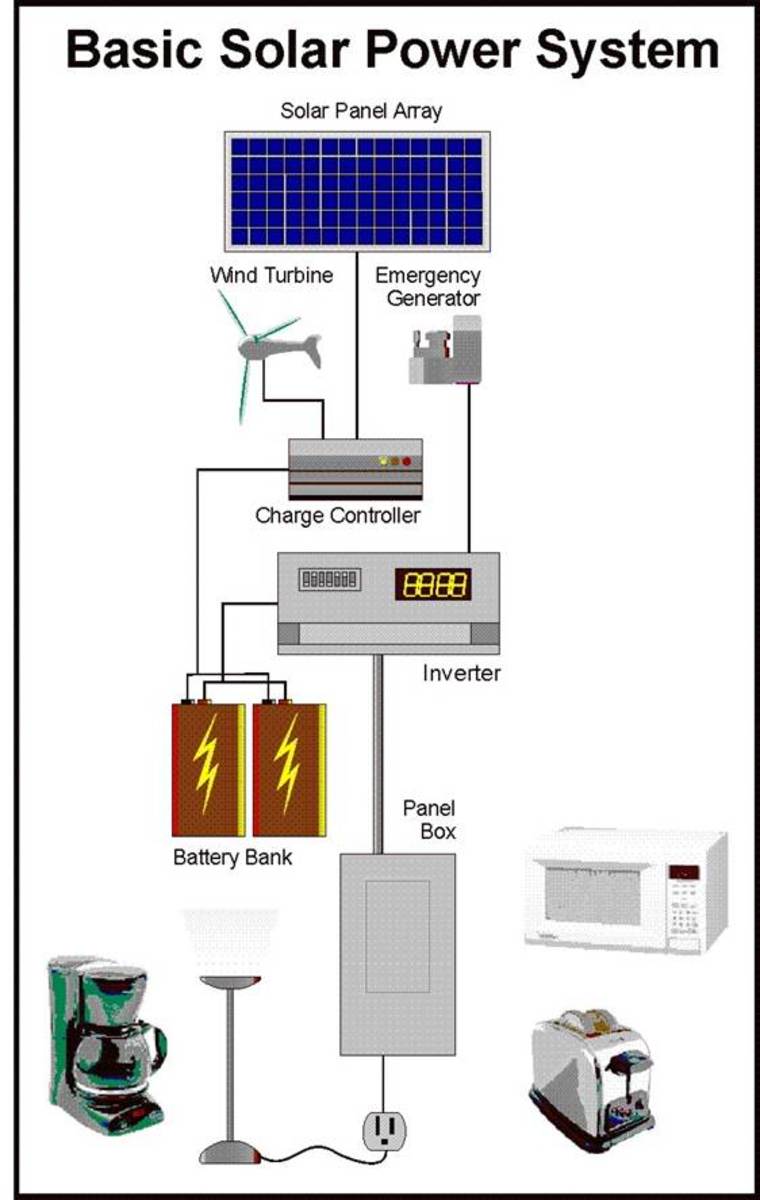A Look Into Renewable Energy Batteries
Renewable Energy House Batteries
ne of the most crucial components of any home that utilizes renewable energy is the house battery bank. You could have 1,000 top of the line solar panels on your roof with a state of the art tracking system but without the battery bank, you'll find yourself sitting in the dark during the night.
Renewable energy house batteries are one of the least understood components of a renewable energy powered home. They are also the most neglected. It doesn't make sense to not be educated when it comes to your battery bank. It makes even less sense to be lazy and neglect them. Quality house batteries are very expensive.
When people think about batteries for solar homes many people have an image of several car batteries wired together. This is a huge misconception. Automotive batteries are designed for very short bursts of energy to start your vehicle. If they are deeply discharged for more than just a few times, they will be permanently damaged and become virtually useless.
When we are talking about house batteries, we are referring to deep cycle batteries. These batteries are much more robust than automotive batteries. They are also specially constructed to withstand many deep discharge and recharge cycles without being damaged.
Most renewable energy applications utilize very large 6 volt flooded lead acid batteries wired together to make up the necessary voltage for a particular type of system. When you wire several batteries together they are referred to as a "bank of batteries".
If the home is a 48 volt system, the 6 volt batteries are wired in pairs of two to make up several 12 volt batteries. These, two battery 12 volt units are then wired to each other until they make up one 48 volt battery. This is usually repeated several times until you have several 48 volt battery banks wired together to increase the banks reserve capacity.
The type of 6 volt batteries are generally used are classified as L16-HC. These batteries generally will store about 400 amp hours of electricity.
Some smaller applications commonly wire several 6 volt 200 amp golf cart batteries together.
If your renewable energy system consists of 20 batteries, think of it as one large battery. Should you neglect them and only one or two were to go bad, you will need to replace the entire bank. This would be very costly and it's really not necessary if you simply perform some basic preventative maintenance.
These deep cycle house batteries are by no means cheap. You can count on paying between $300 and $400 for each battery. Although the initial cost is high, if they are properly maintained, they will outlast smaller, less expensive batteries and will ultimately cost you less in the long run.

Caring For Your Renewable Energy Batteries
ome basic things to remember when caring for a house battery bank are:
- Keep them full of electrolyte. The batteries have removable caps covering each battery cell, you simply remove the cap and replenish the evaporated electrolyte with distilled water. It is of the utmost importance that you use nothing but distilled water. Any other type of water will cause mineral deposits to accumulate on the lead plates in the battery. This will quickly ruin your expensive batteries. Distilled water is readily available in one gallon containers at any grocery store.
- Keep the batteries clean. It's best to treat the
battery terminals with a special spray on anti-corrosive coating. If
you don't do this, corrosion will build up on on every connector. This
corrosion will damage the batteries and compromise the ability of the
wires to conduct electricity. Eventually the battery cells will fail
which will require you to purchase a new bank.
- Keep the
batteries at the proper temperature. Extreme cold and heat will damage
batteries. Unless you're using the batteries in the Arctic, they are
unlikely to get so cold that they will freeze. None the less, it's
important to keep the batteries in an insulated enclosure. Cold
batteries cannot store as much electricity as warm batteries. Deep
cycle batteries don't like to get hot. Heat will permanently damage
them. Keep them in an insulated room or box and out of the sunlight.
- Keep all metal objects out of the battery enclosure. Should you drop a shovel or wrench on the batteries and the metal were to touch both the positive and negative terminals, the battery will short out, causing sparks, a possible explosion, and permanent damage to the batteries.
- Never let the battery bank stay discharged very long. As soon as the bank is depleted, it's important to fully recharge them. If your array of solar panels is not keeping the batteries fully charged each day, it's time to add more panels to the array or decrease the battery bank size. If the bank is only charged to a certain level during each charge cycle, the bank will develop a memory and lose its full storage capacity
That's it, size your renewable energy battery bank accordingly, properly maintain it and you'll enjoy many years of trouble free energy storage.
Pulsing Desulfators
There are devices that you can buy that claim to repair batteries that are badly sulfated. According the the manufacturers of the devices, you simply attach them to the battery and leave them plugged in for several days.
It's best to make sure that the battery has a full charge before attaching the device to the battery.
Supposedly they work by sending constant pulses of electricity into the battery to break the deposits up that have accumulated on the lead plates inside the battery and dissolve it back into the battery acid.
I don't know if they work but if you have some sick batteries, it might be worth a try. There are also chemical battery treatments that you can buy that are supposes to reverse any damage that the battery has received due to improper care. I'm not sure the chemical battery treatments work either but again, it might be worth trying if there's even a slim chance of saving your expensive batteries.

The Best Medicine Is Preventative Maintenance
The best thing that you can go for your batteries is to take care of them in the first place. Renewable energy battery banks are expensive and all too often this component of a renewable energy system is neglected.
You should be diligent about monitoring the water level in your batteries. Letting the water level get too low is the leading killer of renewable energy battery banks. You should also monitor the battery charge state. If your solar panels aren't getting the batteries fully charged each day, you should either add more solar panels or reduce the battery bank size. Not fully charging the batteries frequently, can cause irreversible damage to them.
Excessive heat or cold can be very damaging to your batteries. You should have your battery bank in an insulated room to prevent freezing and in the summer when it's hot, you should probably run a cooling fan in the battery room to keep temperatures for spiking and causing damage to your batteries.
Renewable Energy Links
- www.booneyliving.com
Here's a great website that will teach you how to live off the grid. Check it out!
Renewable Energy Poll
Did you know about proper battery maintenance before reading this?
Alternative Energy Video
Here's an interesting video from National Geographic on alternative energy.








